Related Research Articles

Clara Josephine Schumann was a German pianist, composer, and piano teacher. Regarded as one of the most distinguished pianists of the Romantic era, she exerted her influence over the course of a 61-year concert career, changing the format and repertoire of the piano recital by lessening the importance of purely virtuosic works. She also composed solo piano pieces, a piano concerto, chamber music, choral pieces, and songs.
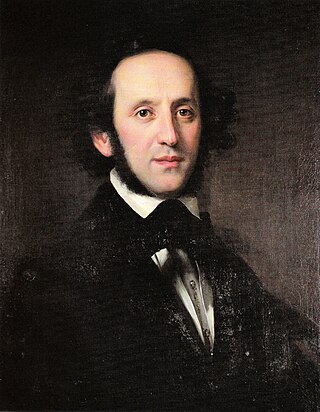
Jakob Ludwig Felix Mendelssohn Bartholdy, widely known as Felix Mendelssohn, was a German composer, pianist, organist and conductor of the early Romantic period. Mendelssohn's compositions include symphonies, concertos, piano music, organ music and chamber music. His best-known works include the overture and incidental music for A Midsummer Night's Dream, the Italian Symphony, the Scottish Symphony, the oratorio St. Paul, the oratorio Elijah, the overture The Hebrides, the mature Violin Concerto, the String Octet, and the melody used in the Christmas carol "Hark! The Herald Angels Sing". Mendelssohn's Songs Without Words are his most famous solo piano compositions.
This article is about music-related events in 1840.
This article is about music-related events in 1837.
This article is about music-related events in 1827.
This article is about music-related events in 1833.
This article is about music-related events in 1831.
This article is about music-related events in 1830.
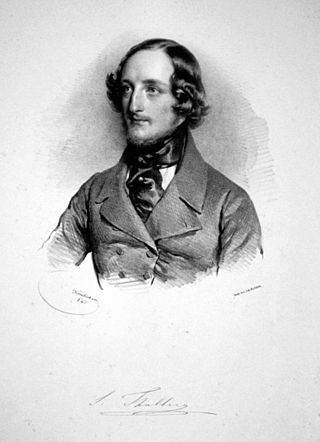
Sigismond Thalberg was an Austrian composer and one of the most distinguished virtuoso pianists of the 19th century.

Niels Wilhelm Gade was a Danish composer, conductor, violinist, organist and teacher. Together with Johan Peter Emilius Hartmann, he was the leading Danish musician of his day, in the period known as the Danish Golden Age.
The "War of the Romantics" is a term used by some music historians to describe the schism among prominent musicians in the second half of the 19th century. Musical structure, the limits of chromatic harmony, and program music versus absolute music were the principal areas of contention. The opposing parties crystallized during the 1850s. The most prominent members of the conservative circle were Johannes Brahms, Joseph Joachim, Clara Schumann, and the Leipzig Conservatoire, which had been founded by Felix Mendelssohn. Their opponents, the radical progressives mainly from Weimar, were represented by Franz Liszt and the members of the so-called New German School, and by Richard Wagner. The controversy was German and Central European in origin; musicians from France, Italy, and Russia were only marginally involved.
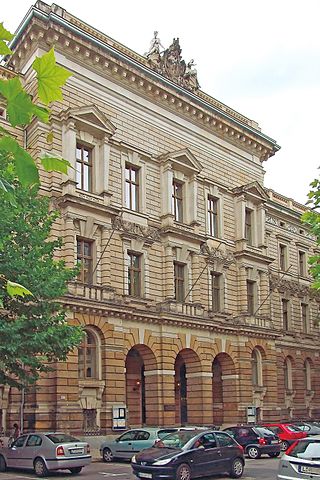
The University of Music and Theatre "Felix Mendelssohn Bartholdy" Leipzig (German: Hochschule für Musik und Theater "Felix Mendelssohn Bartholdy" Leipzig) is a public university in Leipzig (Saxony, Germany). Founded in 1843 by Felix Mendelssohn as the Conservatorium der Musik (Conservatory of Music), it is the oldest university school of music in Germany.

The New German School is a term introduced in 1859 by Franz Brendel, editor of the Neue Zeitschrift für Musik, to describe certain trends in German music. Although the term has frequently been used in essays and books about music history of the 19th and early 20th centuries, a clear definition is complex.

Joseph Christoph Kessler, also seen as Kötzler, was a German pianist and composer who was active mostly in the Austrian Empire. His études, nocturnes, variations, preludes and bagatelles were praised by such people as Franz Liszt, Sigismond Thalberg, Ignaz Moscheles and Friedrich Kalkbrenner, and he was the dedicatee of the 24 Preludes, Op. 28 by Frédéric Chopin.
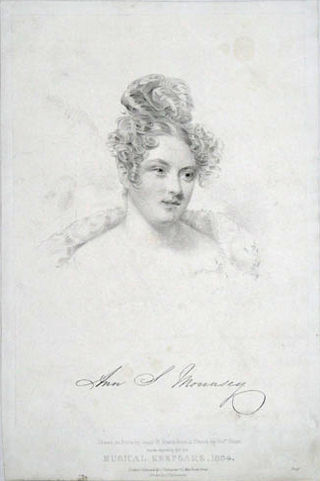
Ann Mounsey or Ann Sheppard Mounsey or Ann Mounsey Bartholomew was born on 17 April 1811 and died on 24 June 1891. She was well known in London as a teacher, conductor, and organist. As a composer, she published songs, hymns, partsongs, large-scale choral worka, and many pieces for the piano and the organ.
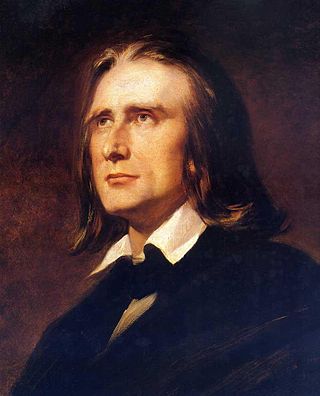
This article lists the various treatments given by Franz Liszt to the works of almost 100 other composers.
Eleonore Henriette Magdalena Grabau-Bünau, also Henriette Grabau or Henriette Bünau, was a German operatic alto and mezzo-soprano. For twelve years she was the main singer at the Leipzig Gewandhaus and from 1843 to 1849 she was the first teacher at the Leipzig Conservatory.

Throughout the 18th century, the appreciation of Johann Sebastian Bach's music was mostly limited to distinguished connoisseurs. The 19th century started with publication of the first biography of the composer and ended with the completion of the publication of all of Bach's known works by the Bach Gesellschaft. A Bach Revival had started from Mendelssohn's performance of the St Matthew Passion in 1829. Soon after that performance, Bach started to become regarded as one of the greatest composers of all times, if not the greatest, a reputation he has retained ever since. A new extensive Bach biography was published in the second half of the 19th century.
Virginia Livia Frege, née Gerhardt was a German singer (soprano), Prima Donna of the Leipzig Stadttheater, arts patron and co-founder of the Leipzig Bach Society. She was referred to as the "Queen of Leipzig's romantic song singing". Frege is best known for her performances of the works by Felix Mendelssohn Bartholdy. Her repertoire included songs by Heinrich Marschner, Franz Schubert, Robert Schumann and Mendelssohn.
References
- 1 2 3 4 5 MusicAndHistory.com: 1835 [ permanent dead link ]
- ↑ Randel, Don Michael (30 October 2002). The Harvard Concise Dictionary of Music and Musicians. Harvard University Press. p. 866. ISBN 978-0-674-25572-2.